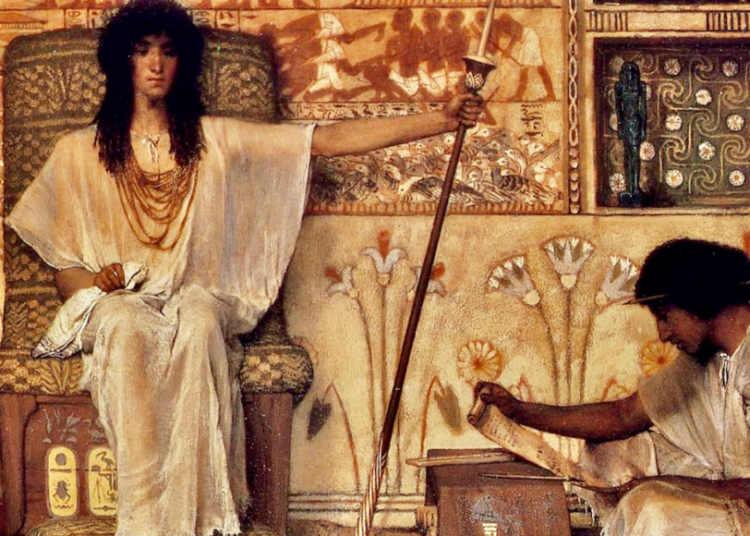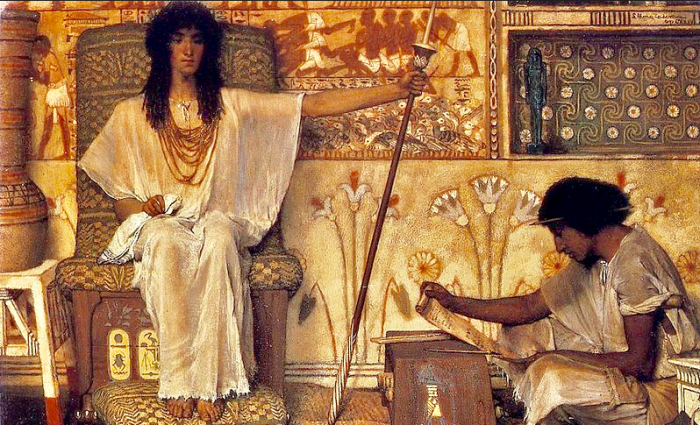As fallen human beings, we live with the threat of sin and temptation, and we can easily choose to follow these rather than Christ. Sins become the “pharaohs” in our lives—those thoughts, words, deeds, and omissions that are foreign to a life in Christ. Like the Pharaoh who knew not Joseph, these sins know not Jesus.
In the final chapters of the book of Genesis, we find Joseph, a person who foreshadows and anticipates the coming of Christ. There are many parallels between the lives of Joseph and Jesus. For example, the malice of Joseph’s brothers, envious of the favoritism shown to him by their father, is similar to that of the Jewish leaders who sought to execute our Lord for claiming to be the Son of God. Before changing their plans and deciding to sell Joseph into slavery, the brothers initially plotted to kill him by throwing him into a pit, leaving him for dead. Their evil plot, in which “they conspired against him to kill him” (Gen 37:18), is echoed by the enemies of Jesus, who “took counsel how to put him to death” (Jn 11:53). The pit into which Joseph was thrown resembles the tomb where Jesus would lay after his death.
God in his providence worked to bring good out of both of these evil situations. Joseph would rise from slavery to serve Pharaoh, gifted by God with the power of interpreting dreams. Such gifts would lead to the survival of Egypt, Israel, and many nations during the years of famine. Jesus’ death and resurrection bring us the true freedom from the slavery that binds us—that of sin—with the promise of eternal life. Moreover, Joseph revealed himself to his brothers after the distribution of grain. Likewise, after his resurrection, Jesus “was known” to the disciples on the road to Emmaus “in the breaking of the bread” (Lk 24:35). Just as Joseph did not let his brothers starve, Jesus does not leave us in spiritual famine, but feeds us with his very self in the Eucharist.
The parallels between Joseph and Jesus also present a moral comparison, helpful for those seeking to live their lives according to the teachings of Christ. Turning the pages from Genesis into the book of Exodus, we read those dire words for the people of Israel: “there arose a new king over Egypt, who did not know Joseph” (Ex 1:8). With no memory or affection for the Hebrew who saved his very nation, this new Pharaoh shunned the Israelites, forcing them into slavery.
When we are united to Christ, our lives reflect his very life. All of our actions should flow from a life of holiness rooted in him. However, as fallen human beings, we live with the threat of sin and temptation, and we can easily choose to follow these rather than Christ. Sins become the “pharaohs” in our lives, those thoughts, words, deeds, and omissions that are foreign to a life in Christ. Like the Pharaoh who knew not Joseph, these sins know not Jesus. Although this Pharaoh may have enslaved the people of Israel, keeping them from the Promised Land, sins (particularly mortal sins) enslave us in a more serious way, severing our very relationship with God.
Lent is approaching in a little over a week, a time not only for spiritual renewal, but also for a deeper examination of one’s life and the faults that often plague our relationship with God. Before entering into the Passover of Christ during the celebration of the Easter Triduum, the Church gives us these several weeks in the desert in order to recognize the “pharaohs” of sin that enslave us. Casting these aside with the help of God’s grace, we come to experience a new, everlasting freedom, a freedom given through the saving passion, death, and resurrection of Jesus. Then even our lives can parallel Christ’s.
Republished with gracious permission from Dominicana (February 2019).
This essay was first published here in March 2019.
The Imaginative Conservative applies the principle of appreciation to the discussion of culture and politics—we approach dialogue with magnanimity rather than with mere civility. Will you help us remain a refreshing oasis in the increasingly contentious arena of modern discourse? Please consider donating now.
The featured image is a detail from “Joseph, Overseer of Pharaoh’s Granaries” (1874), by Lawrence Alma-Tadema (1836-1912), courtesy of Wikimedia Commons.



